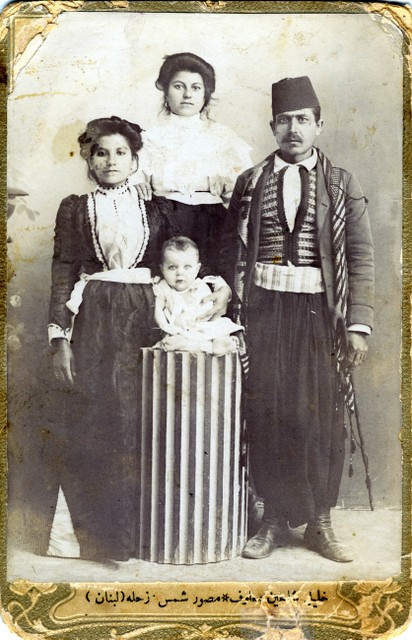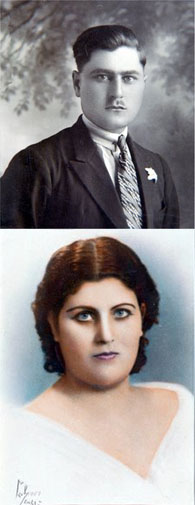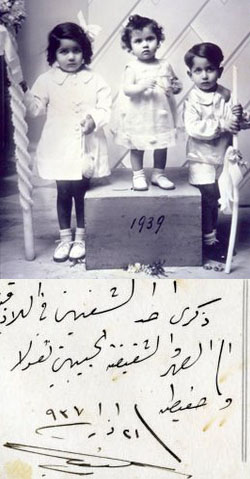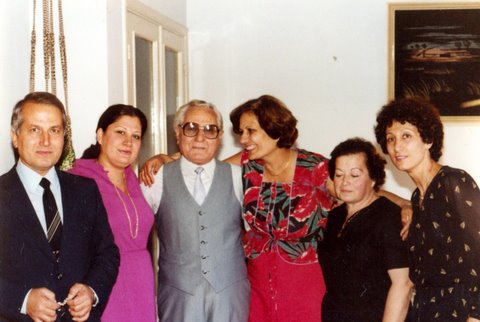Michel AbiEzzi (1910 - 1988)
The late Michel AbiEzzi was born in 1910 in Kherbit-Qanafar Lebanon, to Salim AbouEzzi and Mariam (maiden name Khater). He was preceded with sister Hafiza (BouZamel) in 1909, and followed with sister Zarife (Kassis) in 1911. His father passed away in an accident while they were little, thus leaving Mariam to care for three little kids at the dawn of WWI under Ottoman occupation, which was a very tough period in Lebanon's history.
This photo of Michel as a baby with his parents was discovered by Joseph BouZamel in the summer of 2012, it has "Michael Salim AbouEzzi" written on its back. Notice the Ottoman era attire! On Salim you see the tarbouch, the baakoura, the sherwal almost touching the ground, the tassels starting at the shoulders, the colorful vest with a zillion buttons, etc. We could also see the boots and hands of a farmer.

Michel was highly regarded by his peers as a gentleman, always handsome and elegant, with a sense of humor, was well educated for his generation, and wrote beautifully as exemplified by letters to his grandson. He was loved and respected by his family and friends. His descendents include seven children, twenty one grandchildren, fifty six great-grandchildren, and six great-great-grandchildren (and counting) who are spread throughout the USA: Boston, Chicago, Seattle, Cleveland, SF Bay Area, Virginia Beach, and Southern California. May this page serve as his digital tombstone in this era of internet and globalization.
Towards the end of WWI, one third of the people of Beirut and Mount Lebanon perished from starvation and the plague. People in the Bekaa, the agricultural hub, faired better. At the time, Lebanon was under the control of a decaying Ottoman empire which sided with Germany, and Ottoman rulers imposed compulsory military service. In fact Mariam's brothers were among the recruits and were never heard from again, she was often observed by her grandchildren praying and sobbing in their memory. The famine was caused in a large part by Ottoman commandeering of food supplies compounded by a locusts invasion of crops.
However, Mariam miraculously was able to provide for her little three children and nurture them through this tough time. Her husband used to work for the Donato family in Riyak, which lies in the center of the Bekaa valley close to Zahle and about 40 klms north of Kherbit-Qanafar. Mariam got a job with the same family, probably as a house keeper, and lived with her children in Riyak.
With the Ottoman defeat in 1918, Lebanon became a French mandate, shortly after the borders of modern-day Lebanon were drawn by General Gouraud's colonial government (met his grandson at Eurographics, whom Gouraud-Shading is named after, shared with me that he is writing the story of his grandfather!). Riyak, which is central to the Bekaa with a major railroad station, became an important hub for the French army. Among other developments they erected a military airport there, which still stands. It was in this climate that Michel grew up and received a French education at the Abaa-el-Beed (white fathers) Catholic school in Riyak. Later he worked for the French army running their canteen, the market at their barracks in Riyak.
.jpg)
.jpg)
Michel married Laurice Hage of Mouaalaka, a suburb of Zahle, probably meeting her through her brothers Mansour and Joseph who had jobs with the railroad company in Riyak.
.jpg)

Around 1934, the new couple moved to Latakia on the Syrian Mediterranean coast, where Michel assumed a branch manager position with Singer selling sewing machines. They had their first three children Sonya, Samir and Samira in Latakia.
.jpg)

Upon the start of WWII in 1940 the family came back and settled in a home they rented in Mouaalaka in the neighborhood of Laurice's family. It was in this home that Michel and Laurice had four more children and raised their family. Laurice was known for her warm hospitality and good food. Laurice passed away in February 1967 from cancer. Mariam (Michel's mother) was a saint as described by her grandchildren, she lived with the family until she passed away of old age in 1969.
.jpg)
.jpg)

Michel worked for Singer in Zahle selling sewing machines throughout the Bekaa region. During a certain period he used to put a couple of machines on the back of his bike and go from village to village trying to sell them, travelling up to 100 klms a day.
.jpg)
.jpg)
.jpg)
.jpg)
In the early 60's Michel and his son Samir started their own business at a newly built commercial center strategically situated at the new boulevard and entrance to the city of Zahle. The business prospered and grew into selling all types of home appliances, electronics, carpets, stereo systems, chandeliers, shot guns, etc. The main location of the business was looted and set on fire during the war with the Syrian army in April 1981. Michel continued to run a limited operation at the remaining side store while his son Samir immigrated to the USA with his family in the fall of 1983.
.jpg)
Michel enjoyed working the vineyard which the family acquired in 1969.
.jpg)
Michel remarried to Aida Khouiery of Gazeer and moved to an apartment in Karak. He visited the USA in the 70s and again in the 80s. In his first visit he met his cousin Joseph the son of his aunt Afifi (Salim's sister) in Cleveland OH. Michel passed away in 1988 in Zahle from cancer.

.jpg)
.jpg)
Michel stories:
-
Michel was a very good writer, as suggested by letters to his grandson.
-
Ottoman soldiers stole his lunch, prepared by his mother, on his way to school. He must have been 7 or 8 years old, they must have been desperate.
-
He lost his life's savings trading onions when everyone got into the business the year after the crop did very well. Not only he could not sell his stock, he had to pay to get rid of it.
-
In one of the small Alawi villages in the mountains over Latakia one of Michel's Singer employees made a mistake by leaving a sewing machine at the house of a tribal Sheik who did not pay for it, and it would not be acceptable to ask for the money. On a follow-up visit, Michel admonished his employee in the presence of the Sheik for giving him a low grade machine and ordered him to pack it so that a higher-end one could be sent instead. Off course this was the last visit to that household!
-
His grandson Danny used to call him "papa Michel" and get a Lira reward for that. Michel did not like the age association that comes with "grandpa Michel", so he established a "youthful image enhancing" incentive program among his grandchildren.